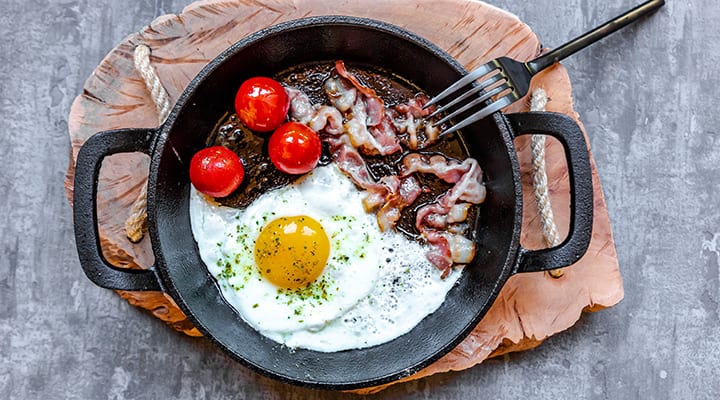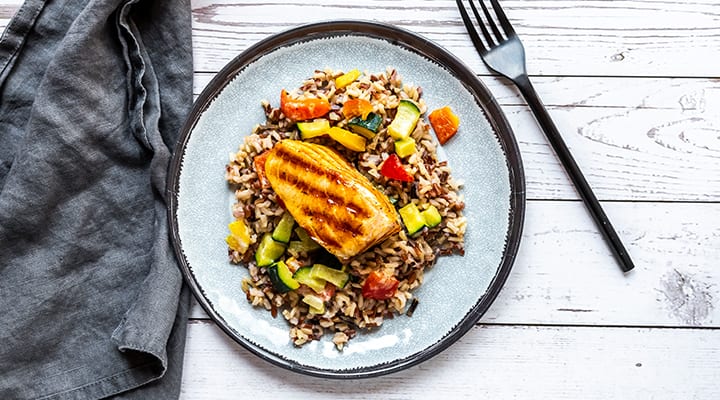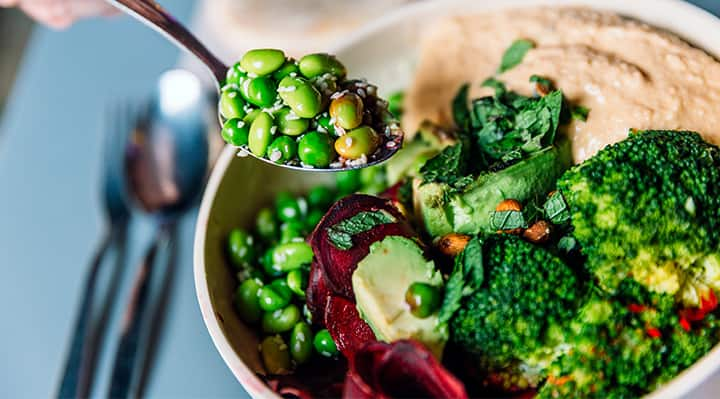
Should I Take Supplements When Dieting?
Published: February 2022
Ever step on the scale only to be greeted by an unwelcome surprise? That expression, “Moment on your lips, pounds on your hips” might make you wonder what you over-ate, and when. Was it that summer abroad in Italy that left you with some unwanted souvenirs? Or all that stress-eating you’ve been doing lately? Of course, it doesn’t really matter whether those extra pounds are imported or domestic—every struggle to button previously well-fitting pants will be an unpleasant reminder that you need to lose weight.
Enter: the diet.
But herein lies a potential landmine: counting those calories (and curbing those cravings!) will ultimately mean eating less food. Could your dieting result in a nutrient deficiency?
Possibly. “You’ll need to incorporate exercise like resistance training and a variety of healthy foods into your lifestyle,” explained registered dietitian Holli Ryan, RD, LD. Choosing these nutrient dense foods will help you stay well-nourished. Beyond that, you can take other steps to stay healthy and make sure you’re getting the nutrition you need, even with a limited diet. Complicating matters, some diets may even lead to common nutrient deficiencies, if you don't supplement.
But losing weight doesn't have to mean a vitamin deficiency, as long as you're strategic about your dietary and supplement intake. Let’s get started.
Do I need vitamins and supplements when dieting?
Since diets generally involve eating more of the good-for-you foods and fewer empty calories, you might think you don’t need to supplement your nutrition. But man cannot live on bread (or meat, or vegetables, or flaxseeds) alone.
With our modern lifestyles and busy schedules, almost everyone could use a boost now and then to their dietary intake—and that is without food restrictions! “With the limited menu some diets offer, it’s important to be aware of what essential nutrients may be left behind, especially for picky eaters,” added Ryan.
How do supplements work?

As we learned when we were young, we don’t just eat for the taste of food—the nutrition is important, too. There’s truth to the proverbial saying “You have to eat all your vegetables if you want to grow up big and strong!”
But some of the compounds that help our bodies run at peak capacity, like omega-3 fatty acids and vitamin D, are tougher to get from diet alone, especially when you follow a low carb diet or eliminate whole food groups, such as meats, or calcium rich sources like dairy. This is where a deficiency can occur.
According to Ryan, supplements are a valuable tool to help us meet our nutrient needs, especially when our diet may be lacking. Supplements can help supply the vitamins, minerals, amino acids, and micronutrients that help keep our bodies energized, our cardiovascular system healthy, and our stress levels stable.
Supplements are also a great way to get targeted nutrition to help you better manage your health priorities. Adding formulas that help boost your focus and attention, probiotics and enzymes that help support your digestion, and even compounds that encourage the breakdown of stored fat are all excellent ways to keep your diet plan on track.
However, it’s important to note that supplements can’t stand in for good nutrition and regular exercise. “They’re meant to complement your good food choices, not replace them,” noted Ryan.
So, you can’t have coffee or energy drinks for breakfast, skip lunch and have a salad for dinner and expect your body to function normally, no matter how many multivitamins you take!
Best supplements by diet type

“Different diets serve up different levels of nutrition,” explained Ryan. Some vastly limit carbs, others focus on cultural staples or avoid animal products.
These checklists can help you figure out what you may need to maintain your best health based on the eating plan you are following:
1. Keto diet supplements

Nutrients you may be missing:
B vitamins (such as folate)
C vitamins
E vitamins
Omega-3s
Potassium
Calcium
Iodine
Magnesium
Supplement recommendation: Two-Per-Day Multivitamin
As the registered dietitian explained, low-carb diets such as the ketogenic (keto) diet take a lot of dedication, mainly because they eliminate so many foods from the typical diet. Say goodbye to breads and pastas, many fruits, potatoes, and most processed foods. All are a no-no when it comes to maintaining the fat-burning balance the diet demands.
With so many restrictions, it isn’t surprising that researchers have found inadequate levels of vitamins, minerals, and other micronutrients in the keto diet. The specific foods a person chooses to eat makes a difference, of course.
What might this look like? A keto dieter eating more fatty fish like salmon is less likely to need omega-3s than someone who chows down on red meat and poultry every day. But with sweet fruits like oranges and bananas in the no-go zone, getting vitamin C, magnesium and potassium will be more of a challenge.
Similarly, calcium might be a challenge for someone avoiding dairy. And dieters who dislike leafy greens and avocados might fall short on sources of vitamin E.
These aren’t the only nutrients at risk. According to Ryan, keto dieters should be aware of the health considerations of cutting carbohydrates and take steps to help maintain their central nervous system and support the health of their liver and kidneys, which can be stressed by the fat loads of a keto diet.
In addition to diet, adding certain nutrients, such as DHEA and carnitine, supports the fat-burning state of ketosis in your body, helping to keep your weight management on track if you decide the keto-path is the path for you.
Pro-tip: Consider taking a nutrient panel test to identify what vitamins and minerals you need, and speak with your doctor or nutritionist to make supplement decisions that best work for your body.
2. Mediterranean diet supplements

Nutrients you may be missing:
Beta-glucans
Supplement recommendation: Mushroom Immune with Beta Glucans
Well, that’s a short list! Why? The Mediterranean diet is highly regarded as one of the best diet plans to follow because it is loaded with healthy fats, lean proteins, and fresh foods. In fact, in a study, those following the Mediterranean diet had a better nutrient profile, meaning they reached adequate intake of nutrients, than the general population. “Since it is a more flexible diet, some find it easier to stick to the plan and continue to make healthy choices,” said Ryan.
But the beta-glucans might be useful since in your efforts to eat Mediterranean diet staples, like salmon and extra-virgin olive oil, you might not be piling your plate high with mushrooms. Beta-glucans are mainly derived from mushrooms, and they help promote a healthy immune response. Those eating variations of the Mediterranean Diet, such as the MIND diet that combines the Mediterranean Diet with the DASH diet, might also benefit from the immune-health benefits of beta-glucans.
Explore Our Best Weight Management Supplements
3. Vegan diet supplements

Nutrients you may be missing:
Omega-3: DHA
Vitamin D
Zinc
Iron
Vitamin B12
Supplement recommendation: Plant-Based Multivitamin
It’s crazy, right? Plants are so good for you! (Hello, vitamin A!) But as the dietitian explained, even though they provide nutrients, they may not be providing the biologically active form of the nutrients your body needs—and like keto, vegan diets are considered restrictive, just in a different way.
Although plants can provide many of the elements a body needs, the diet’s lack of animal sources (including dairy products, which are a good source of calcium) makes it hard for vegans to get enough amounts of several vital nutrients. Therefore, vegan eaters should consider adding dietary supplements to their plates. A vegetarian multi is a must-have—plus, cover all your bases with these additional formulas.
Omega-3 fatty acids—Vegans may get nutrients like omega-3s from plant sources, such as walnuts, but the body must convert the nut’s ALA to DHA, which isn’t a very efficient process. Research shows microalgae, one of the few vegan sources of EPA and DHA, works well to support DHA levels in the body. Therefore, supplementing with a vegetarian form of DHA may be ideal for non-fish foodies.
Vitamin D—Algae and algal oil star in several other vegan supplements, as well, such as vitamin D. This is important because plants lack the ability to produce the D3 form of this vitamin, which is easier for the body to convert into its active form. Most plant foods like mushrooms, almond milk and tofu deliver plenty of D2, which does not convert as efficiently into its active form.
So, vegan dieters run the risk of a vitamin D deficiency. A vegan D3 supplement made with algae can help vegans enjoy the many health benefits that vitamin D supplies, such as strong bones, a sharp mind and a healthy immune system, without compromising their food choices.
Zinc—This mineral makes the list not only because of the bioavailability factor that affects vitamin D, but also because of the absorption factor. “Vegans typically eat high levels of legumes and whole grains, which contain elements that actually bind zinc and inhibit its absorption,” explained Ryan. So, your breakfast cereal might be fortified with zinc, but the elements in the grains of those flakes may reduce the amount of zinc you take in—and the health benefits you enjoy. Because of these factors, those on a plant-based diet sometimes require as much as 50% more of the recommended zinc than others, according to the National Institutes of Health.
What can vegans do? As a registered dietitian, Ryan suggests making changes in the kitchen to reduce the binding and increase the bioavailability of the zinc in foods, like soaking beans in water for several hours before cooking. Vegan dieters can choose leavened grains, such as bread, instead of unleavened grains like crackers, because the processing helps break down those binding elements. And of course, they can also supplement with vegan-friendly zinc supplements to make sure they are getting the immune-supporting benefits of this mineral.
Iron—A mineral that tends to be synonymous with meat, but plants provide iron as well—just a “nonheme” iron that isn’t as bioavailable. Getting enough iron is vital, because it helps red blood cells to carry oxygen throughout your body—so you don’t want to come up short and have an iron deficiency! “Foods like iron-fortified cereal and bread can be a good choice, and vegan staples such as soybeans, spinach, nuts and legumes provide good amounts of this nutrient. Adding iron supplements if found deficient can also help,” added Ryan.
Vitamin B12—This nervous system-support vitamin is found in only trace amounts in plant foods. “Some foods, such as cereal and nutritional yeast, are fortified with vitamin B12,” Ryan said. “However, eating these fortified foods alone is not enough to meet our B12 needs. Therefore, supplementation of this B vitamin is necessary.”
Pro-tip: If you avoid or limit meats and animal products because you follow vegetarian or flexitarian diets, you may also benefit from supplements.
How do you take supplements when dieting?
For some, the hardest part of supplementing (whether you are dieting or not) is remembering to take them. No matter which supplements you are taking, be sure to read those directions—they are printed on the bottle for a reason!
This is really important when you're taking a fat-soluble supplement (such as vitamin E), according to Ryan. “Some nutrients are absorbed better with food because the fat in foods enhances their bioavailability, and others are best taken before meals.”
But regardless of the supplements you add to your daily choices, don’t take more than recommended—it can do more harm than good. Stay within the guidelines, and check with your doctor to make sure your supplements don’t interfere with any medications you are taking.
Are supplements safe when on a diet?
Supplements from a reputable company, with clear labeling and verified testing for purity and potency, are generally safe. But before you begin any weight management or exercise program, you should have a discussion with your physician about your diet and supplements, especially if you take daily medication.
Ways to keep my weight in check

We all want that ideal body, and there are many ways to get there. Keto, Mediterranean, and even reverse dieting have their fans. Ultimately, the best way for you to reach your weight goal is to make the lifestyle changes that will get you there. As you venture into your wellness journey, your smart lifestyle choices will allow your body to find balance and maintain a healthy weight.
Start by reconnecting with your body and making the commitment to exercise regularly and follow a healthy food plan you can thrive on and sustain—even if that means an occasional “cheat meal” every now and then. And weight management supplements can also help.
Not sure where to start? Get a complete metabolic panel blood test to measure your hormone levels and other blood markers. It will shed light on any thyroid health needs you may be overlooking. After all, thyroid hormones, stress hormones (and other hormones) can influence your healthy weight goals.
References
- Alves Martins, Dulce et al. “Alternative Sources of n-3 Long-Chain Polyunsaturated Fatty Acids in Marine Microalgae.” Mar Drugs, June 2013,https://www.ncbi.nlm.nih.gov/labs/pmc/articles/PMC3736422/
- Castro-Quezada, Itandehui et al. “The Mediterranean Diet and Nutritional Adequacy: A Review.” Nutrients, January 2014, https://www.ncbi.nlm.nih.gov/labs/pmc/articles/PMC3916858/
- Churuangsuk, Chaitong et al. “Impacts of Carbohydrate-restricted Diets on Micronutrient Intakes and Status: A Systematic Review.” Obes. Rev., August 2019, https://pubmed.ncbi.nlm.nih.gov/31006978/
- Dallas, Constantin, et. al. “Lipolytic effect of a polyphenolic citrus dry extract of red orange, grapefruit, orange (SINETROL) in human body fat adipocytes. Mechanism of action by inhibition of cAMP-phosphodiesterase (PDE).” Phytomedicine. October 2008. https://pubmed.ncbi.nlm.nih.gov/18617377
- Foster, Meika et al. “Effect of Vegetarian Diets on Zinc Status: A Systemic Review and Meta-Analsysis of Studies in Humans.” J Sci Food Agric., August 2013, https://pubmed.ncbi.nlm.nih.gov/23595983/
- Lane, Katie et al. “Bioavailability And Potential Uses Of Vegetarian Sources Of Omega-3 Fatty Acids: A Review Of The Literature.” Crit Rev Food Sci Nutr., 2014, https://pubmed.ncbi.nlm.nih.gov/24261532/
- Locke, Amy et al. “Diets for Health: Goals and Guidelines.” Am Fam Physician, June 2018, https://pubmed.ncbi.nlm.nih.gov/30215930/
- Muscogiuri, Giovanna et al. “The Management of Very Low-Calorie Ketogenic Diet in Obesity Outpatient Clinic: A Practical Guide.” J Transl Med., October 2019, https://www.ncbi.nlm.nih.gov/labs/pmc/articles/PMC6820992/
- “Iron.” National Institute of Health. Fact Sheet for Health Professionals. https://ods.od.nih.gov/factsheets/Iron-HealthProfessional/
- “Potassium.” National Institute of Health. Fact Sheet for Health Professionals. https://ods.od.nih.gov/factsheets/Potassium-HealthProfessional/
- “Vitamin D.” National Institute of Health. Fact Sheet for Health Professionals. https://ods.od.nih.gov/factsheets/VitaminD-HealthProfessional/
Always be in the know!
Access the latest deals, wellness news, expert health tips & more!





